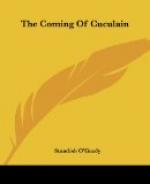The boy came out of that forest on the west side. Soon he struck the great road which from Ath-a-clia [Footnote: Ath-a-cliah, i.e., the Ford of the Hurdles. It was the Irish name for Dublin.] ran through Murthemney to Emain Macha, and saw before him the purple mountain of Slieve Fuad. In his left hand was his sheaf of toy javelins; in his right the hurle; his little shield was strapped upon his back. The boy went swiftly, for there was power upon him that day, and with his ashen hurle shod with red bronze ever urged his ball forward. So he went driving, his ball before him. At other times he would cast a javelin far out westward and pursue its flight. Ever as he went there ever flew beside him a grey-necked crow. “It is a good omen,” said the boy, for he knew that the bird was sacred to the Mor-Reega.
He was amazed at his own speed and the elasticity of his limbs. Once when he rose after having gathered his thrown javelin, a man stood beside him who had the port and countenance of some ancient hero, and whose attire was strange. He was taller and nobler than any living man. He bore a rod-sling in his right hand, and in his left, in a leash of bronze, he led a hound. The hound was like white fire. Setanta could hardly look in that man’s face, but he did. The man smiled and said—
“Whither away, my son?”
“To Emain Macha, to my uncle Concobar,” said the boy.
“Dost thou know me, Setanta?” said the man.
“I think thou art Lu Lam-fada Mac Ethlend,” [Footnote: Lu the Long-Handed son of Ethlenn. This mysterious being, being one of the deities of the pagan Irish, seems to have been the Sun-god.] answered Setanta.
“I am thy friend,” said the man, “fear nothing, for I shall be with thee always.”
Then the man and the hound disappeared as if they had been resolved into the rays of the sun; Setanta saw nothing, only the grey-necked crow starting for flight. Then a second man in a wide blue mantle specked with white like flying foam came against him and flung his mantle over Setanta. There was a sound in his ears like the roaring of the sea. [Footnote: This man was Mananan son of Lir. He was the Sea-god.] Chariots and horses came from the east after that. Setanta recognised those who urged on the steeds, they were his own people. “Surely,” he said, “I shall be taken now.” The men drave past him. “If I mistake not,” he said, “the man who flung his mantle over me was Mananan the son of Lir.”
Divers persons, noble and ignoble, passed him on the way, some riding in chariots, some going on foot. They went as though they saw him not.
In the evening he came to Slieve Fuad. He gathered a bed of dried moss and heaped moss upon his shield for a pillow. He wrapped himself in his mantle, and lay down to sleep, and felt neither cold nor hunger. While he slept a great steed, a stallion, grey to whiteness, came close to him, and walked all round him, and smelt him, and stayed by him till the morning.




